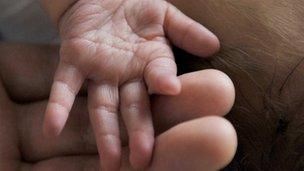Induction cuts risk of babies dying, researchers say
- Published

Induction 'could be safer for babies'
Babies born after labour is induced have less risk of dying but a higher risk of admission to a special-care unit, a study suggests.
The <link> <caption>British Medical Journal analysis of 1.2m births in Scotland between 1981 and 2007</caption> <url href="http://www.bmj.com/lookup/doi/10.1136/bmj.e2838" platform="highweb"/> </link> also found no increased chance of a Caesarean section - contrary to previous findings.
The study looked at full-term births where inductions happened for non-medical reasons - such as a mother's choice.
But one expert said the paper would "not change practice".
Inductions are carried out in around 20% of pregnancies in developed countries.
Using Scottish birth and death records, researchers analysed data for more than 1.2 million women who gave birth to singleton babies after 37 weeks' gestation between 1981 and 2007.
They took into account the mother's age, whether she had given birth before, her social status and the baby's weight.
They then looked at results for births at each week of gestation between 37 and 41, comparing women who had inductions for non-medical reasons with those whose pregnancies continued.
They conclude that a planned induction of labour at each weekly stage was linked to lower death rates before, during or after birth, but did not increasing the need for a Caesarean.
And they said the idea that inductions raised the chance of a C-section had become "obstetric dogma".
'More information'
The researchers calculate that, for every 1,040 women having a planned induction at 40 weeks, one newborn death may be prevented, but there would be seven more admissions to a special-care baby unit than if inductions had not taken place.
Dr Sarah Stock, of the University of Edinburgh's Tommy's Centre for Reproductive Health, said: "Women have the choice of induction or waiting.
"There were concerns about inducing birth, but we didn't find an increased risk of complications or operational delivery. However, we did see an increase in neonatal admissions."
She added : "We are aiming to give more information to women and their care-givers about the options that are there."
Daghni Rajasingam, a consultant obstetrician and spokeswoman for the Royal College of Obstetricians and Gynaecologists, said there were problems with relying on retrospective data to come to these conclusions because it may not have been entered properly at the time.
She said there were "good prospective, well-designed studies showing the link between inductions and Caesarean sections, which is why it's become 'dogma'".
And she said: "Inductions where there are indications are absolutely the right way to go. But this paper is not going to change practice."
- Published14 March 2012